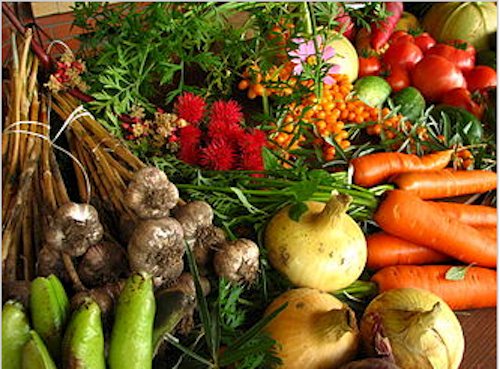Nutritional Differences Between Organic & Conventional Foods?

I'm regularly asked, "Is organically grown food better than conventionally grown?" Of course, intuitively, one would believe yes, there must be a difference. But since I always base my recommendations on science, I've been in a bit of a conundrum over answering this question, because there have been so few studies done.
Yes. It's been scientifically verified that organically grown foods improve the environment in many ways. They also contain a lower level of pesticides. But are there nutritional differences? Some studies say yes, some say no.
One recent study of animal meats published in the British Journal of Nutrition found no significant difference in the meats' nutrients, but did find significant differences in the type of fat in the animal meat. Other studies of farm raised fish get similar results. The grass-grazing cows and wild fish contain more omega-3-fatty acids, a healthy fat associated with reduced inflammation and superior health, and less of the unhealthy fats which are correlated with inflammation and cardiovascular disease.
How about fruits and vegetables? I'd like to think there are nutritional differences, but study results are mixed, that is, of the very few studies conducted. One interesting factor which may contribute to positive findings is that plants without pesticides have to work harder to synthesize phytochemicals to protect themselves against the elements. These phytochemicals are good for human health, too.
A plant exposed to more sun versus less sun will produce more phytochemicals, for instance, a pigment, such as lycopene (red), beta-carotene (orange), and anthocyanin to protect itself. Apparently, plants under more stressful conditions, such as exposure to bugs, disease, heat, cold, and sun, protect themselves with phytochemicals ("Phyto" is plant in Greek). Some plants develop a distinctive, strong smell, like plants in the onion family which produce allinase, or in the broccoli family which produce sulphorphane, both potent nutrients which not only protect the plants' health but our health as well.
But the bottom line is: What you eat profoundly affects not only your health, but the environment, too. This is important news because when it comes to environmental issues and halting global warming, many of us feel overwhelmed and helpless. So it’s amazing that something as simple as making better food choices can reduce global warming by lowering greenhouse gases, saving land, and conserving diminishing water and energy supplies.
Your protein choice will make the most significant difference on the environment (and your health). Producing meat requires six to seventeen times more land than growing vegetable protein, 26 times more water. And producing vegetables is up to 50 times more energy efficient than meat production, according to a study in the American Journal of Clinical Nutrition.
Eating vegetable protein will also save your health. Decades of research has found that plants contain compounds (phytochemicals) with potent powers of healing. People who eat a plant-based diet are leaner, have less cancer, heart disease and diabetes.
But when eating more fruits and vegetables, it’s important to consider how and where they’re grown. Environmental resource conservation is reduced if food is transported long distances and grown in large industrial farms which specialize in only one or a few foods. Locally, organically produced food saves water, energy and encourages a region’s unique varieties of fruits and vegetables. Heirloom varieties, for example, have been passed down through generations, have natural resistance to pests, disease and are better able to tolerate local conditions without too much exra energy, pesticides or water.
How you can protect the environment through your food choices:
* Buy seasonally and locally at farm stands and farmers’ markets,* Eat a plant-based diet,* Reduce meat consumption,* Use heirloom varieties, whenever possible,* Buy organic whenever possible.
